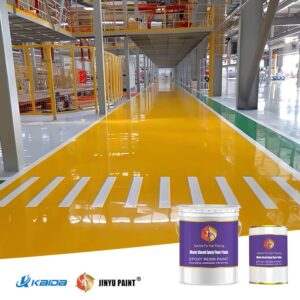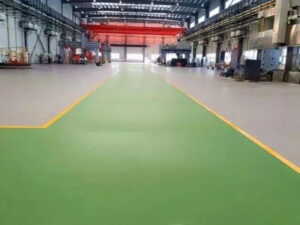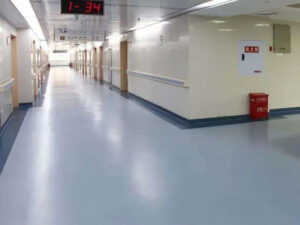
JINYU PAINT®
Coating OEM/ODM Manufacturer
JINYU PAINT® Water Based Epoxy Floor Coating
In factory workshops, underground parking lots, and hospitals, we will see a layer of floor coating for concrete on the floor. The main function of floor paint is to ensure the cleanliness of the floor, prevent the ground from slipping, and ensure wear resistance. There are various types of floor coatings on the market, and water-based floor paint is widely popular in the market. So, why do so many people choose water-based floor coating? Let’s learn about water-based floor paint.
Water-based floor coating uses:
1. Water-based epoxy resin floor coating has good performance and is often used on the floors of industrial sites.
2. Water-based floor paint can be used as wood floor coating: it can be made into varnish for wood floors, replacing the solvent-based polyurethane crystal floor paint widely used in the market; it can be made into colored paint to replace solvent-based epoxy resin floor paint and polyurethane enamel, and can be used in kitchens, furniture, mechanical equipment, etc.
3. Water-based floor paint is also used for building bonding and waterproofing, anti-corrosion treatment, as a concrete sealing primer and other purposes.
4. Water-based floor coating is used for anti-seepage of construction projects. Water-based epoxy resin floor paint has excellent mechanical properties and compatibility with cement. It is used to prepare high-strength concrete. Water-based epoxy resin floor paint is added to concrete or cement mortar as an auxiliary component and can improve the anti-seepage of concrete.
Advantages of water-based floor paint:
1. Water-based floor paint uses water as a diluent, which is pollution-free and meets environmental protection requirements. It is safe and non-flammable, and the safety during storage, transportation and use is guaranteed.
2. Water-based floor paint has very good adhesion to various cement substrates, and has very good chemical resistance and corrosion resistance to the cured coating film. The water-based floor paint coating has small shrinkage, high hardness and wear resistance.
3. Water-based floor coating can be used at room temperature and in a humid environment. The sealing primer has good permeability and strong adhesion to the cement substrate. It can seal the pores of the cement without cracking, bubbling or peeling, thus overcoming the weakness of solvent-based epoxy floor paint that is sensitive to water.
4. The price of water-based floor paint is very reasonable, and the construction performance is also good. Water can be directly added to adjust the construction viscosity. The construction tools can be directly cleaned with water. It is easy to use and has low coating cost.
JINYU PAINT® PRODUCTS
Water-based Epoxy Floor Vs Oil-based Epoxy Floor
1. In terms of breathability
The water vapor diffusion coefficient of water-based epoxy coating is 23.500u H20, which has good air permeability, allowing the water vapor at and below the base layer to be discharged smoothly, which can completely solve the risk of blisters. It can be used in damp or humid environments without mold, and the anti-mildew level is the highest level 0.
Traditional solvent-based paints lack air permeability, which prevents water vapor from being discharged from the base layer and below, making blisters prone to occur. They cannot be used on wet or damp surfaces.
2. From the perspective of environmental protection
Water-based epoxy paint uses water as solvent, so the VOC content and heavy metal content are almost 0, there is almost no pungent smell, no environmental pollution, it is non-flammable, and there is no risk of explosion and oxidation. It is not a radioactive hazardous substance and is not a corrosive substance.
Solvent-based coatings generally use organic substances such as toluene or xylene as solvents, have a strong pungent odor, high VOC, and are highly polluting; they are flammable and explosive and are classified as dangerous goods.
3. In terms of construction period
Water-based epoxy flooring can be constructed 7 days after concrete pouring, even under high temperature conditions.
However, solvent-based traditional floor concrete can only be constructed 28 days after pouring, and the organic matter is highly volatile and pungent under high temperature conditions.
4. In terms of scope of application
Water-based epoxy flooring has a wide range of applications and can be used in various occasions.
However, the application scope of traditional solvent-based flooring is narrow. It cannot be used in closed or humid places and is prone to harm.
5. In terms of physical properties
The hardness of water-based epoxy floor can reach more than 2H, and it has the same or higher physical properties as oil-based epoxy, which is one of the most important characteristics of w
FAQs of Water Based Epoxy Floor Coatings
1.What is water-based epoxy floor paint?
A1: Water-based epoxy flooring is a high-strength, wear-resistant and beautiful flooring with the advantages of seamless, solid texture, good chemical resistance, corrosion resistance, waterproof, dustproof, easy maintenance and low maintenance cost.
-
2. What areas are water-based epoxy flooring suitable for?
A2: Production workshops, dust-free workshops, warehouses, workshops, warehouses and underground garages with special requirements such as anti-static and explosion-proof, factories and corridors in textile, tobacco, food, schools, hospitals and other industries, machinery factories, parking lots, especially walkways where forklifts, cars and heavy carts are needed.
3.How many types of water-based floor paint are there?
A3: a. Water-based epoxy floor paint; b. Water-based polyurethane floor paint; c. Water-based inorganic composite floor paint
4. What is the thickness of the water-based epoxy floor?
A4: The general thickness is about 0.5mm-10mm. If it is too thin, it will easily delaminate and crack.
5. Is water-based epoxy flooring oil-proof?
A5: It has anti-penetration effect on general motor oil, gear oil, etc.
6. Is water-based epoxy flooring acid and alkali resistant?
A6: A. Resistant to 30% sulfuric acid for 7 days without any change; B. Resistant to 40% sodium hydroxide for 7 days without any change; C. Resistance to gasoline 120#, no change in 7 days; D. Lubricating oil resistance has no change after 7 days.
7. Can water-based epoxy flooring be used outdoors?
A7: Water-based epoxy floor paint is generally used indoors because it is not resistant to UV rays, while polyurethane floor paint can be used outdoors.
8. Is water-based epoxy flooring fireproof?
A8: Ordinary epoxy floor is flammable, and water-based epoxy floor paint is flame retardant.
9. What is the price of water-based epoxy flooring?
A9: The price of water-based epoxy flooring varies according to the type and materials used. The specific pricing depends on the type selected and the market at the time.
10. Is water-based epoxy flooring toxic?
A10: Water-based epoxy floor paint uses environmentally friendly raw materials, and the floor is generally harmless to the human body after the curing and maintenance period.
11. How many colors are there for water-based epoxy flooring?
A11: Water-based epoxy flooring has a rich variety of colors, and commonly used colors include red, green, gray, yellow, etc. The specific color can be selected according to the national standard color blocks. Yingwanjia has produced special floor paint color cards.
12. How many years can water-based epoxy flooring generally last?
A12: The service life of water-based epoxy flooring is determined by the type of flooring selected and the degree of maintenance it receives. Generally, 3-5 years is normal.
13. What are the requirements for the base layer of water-based epoxy flooring?
A13: The base strength is required to be greater than C20 and the flatness must meet national standards. A waterproof layer must be made and the moisture content of the floor must be below 8%. The base must be polished and clean and dust-free.
14. Can epoxy be applied to a water-based base layer without a waterproof layer?
A14: It is generally not recommended.
15. Can water-based epoxy flooring be made on top of terrazzo?
A15: It can be done, but it needs to be polished.
16. How long does it take for water-based epoxy flooring to cure?
A16: Conventional epoxy materials generally last 10-12 hours in summer and 12-24 hours in winter.
17. Can water-based epoxy flooring be used on courts?
A17: Outdoor courts are not recommended.
18. Will water-based epoxy flooring become irritating?
A18: Water-based epoxy flooring is non-flammable and fire-resistant.
19. Can water-based epoxy flooring be made in a mechanical processing plant?
A19: It can be done, but the service life will be shortened due to the harsh operating environment.
20. How to solve the noise problem when using water-based epoxy flooring in underground garages?
A20: The noise problem is more difficult to deal with. The only way is to reduce emergency braking and reduce speed as much as possible.
21. Can scratches on the surface of water-based epoxy floor be repaired?
A21: It is difficult to repair. If the damage is serious, you can apply a new layer of topcoat or add a topcoat to the finished floor for protection.
22. Can water-based epoxy flooring be used in the food industry?
A22: Yes, water-based epoxy floor paint is environmentally friendly and non-toxic, and some can reach food grade.
23. Are there national acceptance standards for water-based epoxy flooring?
A23: The standard is now being implemented on a trial basis.
24. What is the difference between water-based epoxy flooring and polyurethane flooring?
A24: The materials used are different, so the performance is also different. Water-based epoxy has better toughness and can be used indoors at a cost-effective price, while polyurethane has better hardness and is UV-resistant and can be used outdoors.
25. Can water-based epoxy flooring be used in cold storage?
A25: It is generally not recommended for use in cold storage.
26. What is the temperature adaptability range of water-based epoxy flooring?
A26: The applicable temperature varies depending on the materials and curing agent used.
27. What are the construction temperature requirements for water-based epoxy flooring?
A27: The construction temperature is 5 degrees to 30 degrees.
28. What is the reason for shrinkage holes in water-based epoxy floors?
A28: The base layer is not sealed well, the material is not mixed evenly, and the material solidifies too quickly.
29. What is the reason for knife marks on water-based epoxy self-leveling floors?
A29: The material solidifies too quickly, resulting in poor leveling and insufficient auxiliary defoaming.
30. What are the characteristics of water-based epoxy flooring?
A30: Beautiful, good integrity, corrosion resistance, acid and alkali resistance, etc.
31. Does water-based epoxy flooring require expansion joints?
A31: It is determined based on the area of the floor and the layout of expansion joints in the base layer.
32. How long after the water-based epoxy floor is completed can it be used?
A32: A curing period of at least 7-10 days is required.
33. Why does the water-based epoxy floor peel off?
A33: There are problems with the base material or the treatment is not in place, the layer removal is not thorough, there is no waterproof layer or the load seriously exceeds the design load.
34. What precautions should be taken when using water-based epoxy flooring?
A34: ①After the floor construction is completed, it needs to be cured for 7-10 days before it can be put into use. During the curing period, water or other solutions should be avoided from infiltrating the surface.
35. Is there dust during the construction of water-based epoxy flooring?
A35: There will be some dust, but the dust can be minimized by using construction equipment.
36. What are the requirements for air humidity in the construction of water-based epoxy flooring?
A36: The best requirement is between 30% and 85%.
37. What are the requirements for ground moisture content in water-based epoxy floor construction?
A37: Not more than 8%.
How Featured JINYU Paints Are Made?
JINYU® starts with the careful selection of high-quality raw materials, including resins, pigments, additives, and solvents. Each component is chosen for its ability to meet stringent quality standards.

The selected raw materials are combined in precise proportions in state-of-the-art laboratories. JINYU®’s chemists and material scientists formulate coatings that achieve specific characteristics, such as durability, adhesion strength, and environmental responsibility.
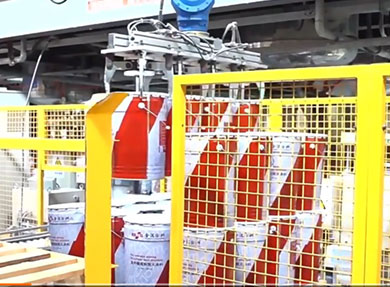
Rigorous quality control measures are in place throughout the manufacturing process. JINYU®’s coatings undergo various tests and inspections to ensure they meet or exceed industry benchmarks.

After formulation and quality assurance, the coatings are produced in large batches using advanced machinery. They are then carefully filled into containers and labeled, maintaining product integrity.
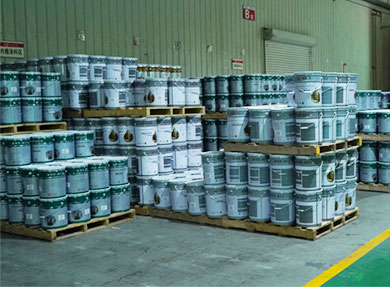
JINYU® boasts a wide range of color options and customization possibilities. Color experts work closely with customers to create unique shades and finishes to suit their specific projects.

JINYU® is committed to sustainability. The company actively seeks eco-friendly solutions, offering low-VOC coatings and environmentally responsible formulations.

JINYU® provides excellent customer support. The team offers guidance on product selection, application techniques, and troubleshooting to ensure customers achieve the best results.

With a global presence, JINYU® serves diverse markets and climates, considering regional variations in building practices and regulations.

The Applications of Featured JINYU PAINT®
JINYU PAINT® provides a comprehensive range of high-performance coatings, including epoxy floor coatings, industrial coatings, fireproof coatings, and architectural coatings for interior and exterior walls. Our solutions are designed for durability, aesthetics, and protection across various applications, from residential and commercial buildings to industrial facilities and fire safety projects. Whether you need seamless flooring, corrosion resistance, fire protection, or decorative wall finishes, JINYU PAINT® offers expert coatings to enhance and protect every surface.







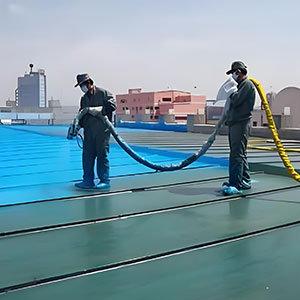
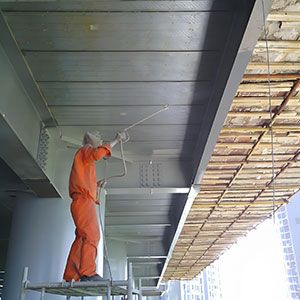
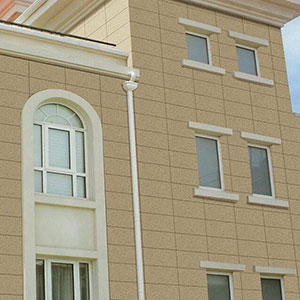
FAQ
- What is the Proper Process for Applying Polyurethane Floor Paint in Large Industrial Spaces?
- What Types of Floors Are Compatible with Polyurethane Paint?
- Is Polyurethane Floor Paint Suitable for Industrial Environments?
- What Factors Should I Consider Before Choosing Polyurethane Floor Paint for Industrial Use?
- How to Apply Water Based Polyurethane for Floors: A Step-by-Step Guide
Contact Us
Contact: Ms. Sabella Wei
Phone: 86-022-83859963
Whatsapp: 15822925523

